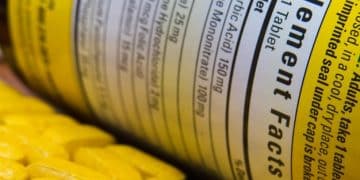Financial Impact: Are Expensive Anti-Aging Supplements Worth the Money?

Expensive anti-aging supplements often promise significant health benefits, but the financial investment may not always align with the scientifically proven results, prompting a careful evaluation of their true value.
The quest for eternal youth has fueled a multi-billion dollar industry, with expensive anti-aging supplements leading the charge. But, considering the **financial impact: are expensive anti-aging supplements really worth the investment?** Let’s delve into the science, the costs, and the potential benefits to help you make an informed decision.
Understanding the Anti-Aging Supplement Market
The anti-aging supplement market is vast and ever-expanding, filled with products promising to reverse the effects of aging, improve overall health, and extend lifespan. Before considering the financial implications, it’s crucial to understand what these supplements are and what they claim to do.
These supplements often contain a mix of vitamins, minerals, herbal extracts, and other compounds that are believed to have anti-aging properties. From boosting collagen production to reducing inflammation, the purported benefits vary widely. However, it’s essential to approach these claims with a critical eye.

Popular Anti-Aging Ingredients
Many anti-aging supplements boast formulations with scientifically recognized (or pseudo-recognized) ingredients.
- Resveratrol: Often found in grapes and red wine, touted for its antioxidant and anti-inflammatory properties.
- Coenzyme Q10 (CoQ10): Plays a vital role in energy production within cells, with potential benefits for heart health and cognitive function.
- Nicotinamide Mononucleotide (NMN): A precursor to NAD+, which is involved in cellular repair and energy production, showing promise in preclinical studies.
- Collagen: A structural protein that supports skin elasticity, joint health, and bone strength.
It’s important to consult with a healthcare professional before starting any new supplement regimen, especially if you have underlying health conditions or are taking medications.
The Actual Cost of Anti-Aging Supplements
The financial commitment to anti-aging supplements can be substantial, especially when considering the ongoing nature of their use. Beyond the initial purchase price, there are other costs to consider.
The price range for anti-aging supplements varies widely. Some basic vitamin supplements can cost as little as $10-$20 per month, while more specialized formulas with multiple ingredients or higher dosages can run upwards of $100 or more per month.
Hidden Costs to Consider
Consider ongoing costs and potential side-effects when factoring in the affordability.
- Dosage and Duration: The recommended dosage and duration of use can impact the overall cost. Some supplements require higher dosages for optimal effects, which can quickly deplete your wallet.
- Brand Reputation Considerations: Lower quality brands may have lower costs, but the ingredients could be less potent, which impacts efficacy.
- Potential Side Effects: Some anti-aging supplements can interact with medications or cause adverse reactions. Managing these side effects may require additional medical expenses.
Be wary of free trials or subscription services that may automatically charge your credit card each month unless you cancel within a specific timeframe.
Evaluating the Scientific Evidence
Before investing in expensive anti-aging supplements, it’s imperative to critically evaluate the scientific evidence supporting their claims. Many supplements are marketed with promises of dramatic results, but the reality may be far different.
While some anti-aging ingredients have shown promise in laboratory studies or animal models, the evidence in humans is often limited or inconclusive. Research is ongoing to determine the optimal dosages, long-term effects, and safety profiles of these supplements.

Understanding Research Limitations
Peer reviews and statistical significance are major components to understanding the effect of supplements.
- Sample Size: Small sample sizes can limit the statistical power of the study and make it difficult to generalize the results to a larger population.
- Study Design: The use of placebo controls and double-blinded methodologies are essential for minimizing bias and ensuring the reliability of the findings.
- Publication Bias: Positive results are more likely to be published than negative or inconclusive findings, which can create a distorted view of the true effectiveness of a supplement.
Be cautious of testimonials or anecdotal evidence, as they may not reflect the experiences of the majority of users. Look for studies published in reputable scientific journals and consider the totality of the evidence before making a decision.
Determining the Return on Investment (ROI)
Calculating the return on investment for anti-aging supplements involves weighing the potential benefits against the financial costs. However, this can be challenging due to the subjective nature of perceived benefits and the lack of standardized measures.
Some individuals may experience noticeable improvements in energy levels, skin appearance, or joint comfort with certain supplements. Others may not see any significant changes, despite prolonged use. The effectiveness of a supplement can vary depending on individual factors such as age, genetics, lifestyle, and underlying health conditions.
Calculating the ROI
Calculating ROI is fairly simple. Just subtract the cost by the actual realized value.
To determine whether an anti-aging supplement is worth the investment, consider the following steps:
- Identify Your Goals: What specific benefits are you hoping to achieve by taking the supplement?
- Track Your Progress: Monitor your health metrics over time and compare them to your baseline measurements.
- Conduct a Cost-Benefit Analysis: Factor in the financial costs (purchase price, medical expenses, etc.) and the potential benefits.
Remember, results are not guaranteed, and individual experiences may vary. A balanced approach to health and aging is key.
Alternative Strategies for Healthy Aging
While anti-aging supplements may offer some potential benefits, they are not a substitute for healthy lifestyle habits. In many cases, adopting simple and sustainable strategies can yield far greater returns on investment.
A well-balanced diet rich in fruits, vegetables, whole grains, and lean protein provides essential nutrients that support overall health and longevity. Regular physical activity, such as aerobic exercise and strength training, helps maintain cardiovascular health, muscle mass, and bone density.
Cost-Effective Alternatives
It’s easy to skip out on the gym, but it pays off. Here are tips to consider.
- Mindfulness and Stress Reduction: Chronic stress can accelerate aging by increasing inflammation and oxidative damage. Practicing relaxation techniques such as meditation, yoga, or deep breathing exercises can help reduce stress levels and promote well-being.
- Prioritize Sleep: Adequate sleep is crucial for cellular repair, hormone regulation, and cognitive function. Aim for 7-9 hours of uninterrupted sleep per night.
- Stay Hydrated: Drinking plenty of water helps maintain skin elasticity, lubricates joints, and supports optimal organ function.
Focus on establishing sustainable habits rather than relying solely on supplements.
Making an Informed Decision About Anti-Aging Supplements
The decision to invest in expensive anti-aging supplements should be based on careful consideration of the scientific evidence, financial costs, and individual health goals. There is no one-size-fits-all answer, and what works for one person may not work for another.
Before starting any new supplement regimen, consult with a healthcare professional to discuss your health history, current medications, and potential risks and benefits. Be wary of products with outlandish claims or celebrity endorsements, as they may be more hype than substance.
Ultimately, the most effective approach to healthy aging involves a holistic lifestyle that encompasses balanced nutrition, regular exercise, stress management, and social connectedness.
| Key Point | Brief Description |
|---|---|
| 💰 Financial Costs | Consider the initial price, ongoing costs, and potential medical expenses from side effects. |
| 🧪 Scientific Evidence | Evaluate research carefully, noting sample sizes, study design, and publication bias. |
| 💪 Alternative Strategies | Healthy eating, regular exercise, stress management, and sufficient sleep are cost-effective alternatives. |
| 🎯 Individual Goals | Align supplement use with your personal health goals and track progress accordingly. |
Frequently Asked Questions
▼
In the US, the FDA regulates supplements differently than drugs. Supplements do not require pre-approval, so manufacturers don’t have to prove safety or efficacy before selling them. The FDA can take action against unsafe supplements after they reach the market.
▼
Despite marketing claims, no supplement can definitively reverse aging. Some supplements can support certain bodily functions and possibly slow age-related decline, but the effects are usually subtle and vary by person.
▼
Side effects vary widely depending on the supplement and the person taking it. Common side effects include digestive issues, allergic reactions, and interactions with medications. It’s important to consult a healthcare provider before starting any new supplement.
▼
Look for supplements that have been third-party tested for purity and potency. Reputable certifications indicate that the product has been independently verified. Also, research the brand to ensure it has a positive reputation.
▼
Yes! A healthy diet rich in antioxidants, regular exercise, adequate sleep, stress management techniques, and staying hydrated can all significantly contribute to healthy aging and overall well-being, often more effectively than supplements alone.
Conclusion
In conclusion, while the allure of expensive anti-aging supplements is strong, a critical evaluation of their financial impact, scientific backing, and potential benefits is essential. Prioritizing a holistic approach to health, including a balanced lifestyle and consulting with healthcare professionals, can provide a more sustainable and effective path to healthy aging.





